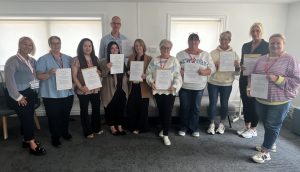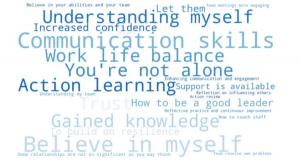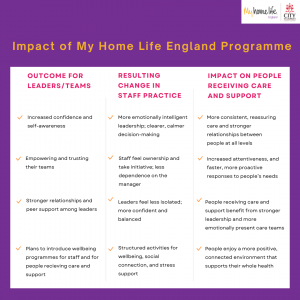Empowering Care Leaders in Cheshire: Reflections from their PSDP Completion
“This programme has shown just how powerful it can be when leaders are given the time, tools, and trust to reflect, connect, and grow.” – My Home Life England programme facilitator
12 care leaders from Cheshire West and Cheshire recently completed their My Home Life England Professional Support and Development Programme (PSDP), with widespread positive outcomes for themselves and for the people they support!
The group consisted of care home managers, clinical nurse leads, a deputy manager and wellbeing coordinator. For 10 months, they engaged with evidence-based frameworks such as Relationship-Centred Care, Appreciative Inquiry, and the Senses Framework, while using practical tools including the Visual Inquiry Postcards, Caring Conversations, and Mapping Relationships, in a programme designed to support long-term leadership development.
Participants shared openly about the challenges they were facing, from managing complex care needs and navigating organisational change, to supporting staff wellbeing and avoiding burnout. Through the programme, the resources, and the support of their peers, they discovered new ways to lead with confidence, empathy, and resilience.

What Changed for the Leaders?
The impact of the programme is clear:
- All leaders reported improvements in the quality of their management and leadership, in their understanding of how to improve the culture of care, and a greater ability to make sufficient time to support staff.
- 90% reported improvements in their confidence, communication skills, staff engagement, and all-round job satisfaction.
- 80% felt a stronger sense of being valued in their roles, with 67% experiencing reduced stress levels.
One care manager shared:
“The most impactful aspects of the programme for me have been the focus on practical leadership skills. Learning how to effectively influence and motivate others really stood out, as did the strategies for promoting wellbeing among both residents and staff. Additionally, the programme’s collaborative approach and real-life case studies helped me connect theory with practice in a meaningful way.”
Another reflected:
“What stood out the most was the open communication and how after each session I came away feeling empowered with food for thought. The sessions gave me time to evaluate so many areas of my workplace.”

Wider Outcomes
The ripple effect of the programme extended beyond the 12 care leaders. As they grew in confidence and developed more relational leadership, their teams also became more engaged and self sufficient, and people receiving care and support benefited from more proactive, consistent, and compassionate care, and a more positive overall care environment.
This table demonstrates how the impact is being felt across services:

Looking Ahead
“The methods that were shared on the course will prove to be invaluable in helping me build an empowered and dynamic team.” – Care Manager
Reflective tools introduced during the programme have now been embedded and are shaping everyday practice — including more productive team meetings, collaborative supervisions, and the introduction of structured wellbeing activities.
Sarah McGlynn, Market Sustainability and Improvement Manager for Cheshire West and Chester Council, reflected:
“We’ve been working with My Home Life England since 2023. We are always looking for ways to support our providers in their quality improvement work and in learning new skills and gaining confidence within their work areas… All attendees without exception shared that they had gained a lot from the MHLE programme and would recommend it to others. We look forward to working with the team again.”
The programme facilitator added:
“It was uplifting to hear how the My Home Life resources, the action learning, and the relationships built during the programme are already making a difference. Participants shared plans to embed what they’ve learned into everyday practice — helping to build positive, healthy cultures that continuously improve, support their teams, and ultimately provide the best possible care for the people they support.”
Congratulations to these care leaders! Each person shared a strong desire to “make things better”, and came away empowered to lead positive change, to nurture people, relationships, and culture, and have embedded their learning into their teams and organisations.